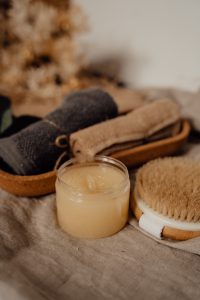Soft Skin with Exfoliation

If you want to achieve a healthy, glowing complexion, exfoliation is a must-have step in your skincare routine. This simple yet effective technique can help to remove dead skin cells, unclog pores, and boost cell turnover, resulting in brighter, smoother, and more radiant skin. In this blog post, we’ll take a closer look at the benefits of exfoliation and how to do it right for the best results.
Why exfoliation is important for glowing skin?
Exfoliation is the process of removing dead skin cells from the surface of your skin. When these cells accumulate on the surface, they can make your skin look dull, dry, and rough. By removing them, you can reveal the fresher, smoother skin underneath, and create a more radiant complexion.
In addition to the immediate benefits, exfoliation can also help to improve the overall health of your skin. By removing dead skin cells, you can unclog pores and prevent the buildup of oil and bacteria that can lead to acne and other skin issues. Exfoliating can also stimulate cell turnover, which is the process by which your skin regenerates new cells. This can help to reduce the appearance of fine lines and wrinkles and promote a more youthful, healthy-looking complexion.
How to exfoliate your skin properly?
Now that we’ve talked about why exfoliation is important, let’s take a closer look at how to do it properly. Here are some tips to keep in mind:
Choose the right exfoliator: There are two main types of exfoliators: physical and chemical. Physical exfoliators use abrasive particles, such as sugar, salt, or microbeads, to scrub away dead skin cells. Chemical exfoliators, on the other hand, use acids, enzymes, or other chemicals to dissolve the dead skin cells. Both types can be effective, but it’s important to choose the right one for your skin type and concerns. If you have sensitive skin, for example, you may want to opt for a gentler chemical exfoliator, while those with oily or acne-prone skin may benefit from a physical exfoliator.

Use gentle pressure: Whether you’re using a physical or chemical exfoliator, it’s important to use gentle pressure when applying it to your skin. Scrubbing too hard can cause irritation, redness, and even micro-tears in your skin, which can lead to more serious issues over time. Instead, use light, circular motions to gently massage the product into your skin.
Don’t overdo it: While exfoliation can be beneficial for your skin, it’s important not to overdo it. Depending on your skin type and the product you’re using, you may only need to exfoliate once or twice a week. Over-exfoliating can strip your skin of its natural oils and cause dryness, irritation, and inflammation.
Follow up with a moisturizer: After you’ve exfoliated, it’s important to follow up with a good moisturizer to help replenish your skin’s natural oils and keep it hydrated. Look for a moisturizer that’s formulated for your skin type and that contains ingredients like hyaluronic acid, ceramides, or glycerin to help lock in moisture.
Protect your skin from the sun: Exfoliating can make your skin more sensitive to the sun, so it’s important to protect it with a broad-spectrum sunscreen with an SPF of 30 or higher. Wear a hat or stay in the shade if you’re going to be outside for an extended period of time, and reapply your sunscreen every two hours.

In conclusion, exfoliation is an essential step in any skincare routine if you want to achieve a healthy, glowing complexion. Exfoliation is a key component of a healthy skincare routine, as it can help to remove dead skin cells, unclog pores, and promote cell turnover, resulting in a brighter, smoother, and more radiant complexion.
However, it’s important to choose the right exfoliator for your skin type and to use it properly to avoid causing damage or irritation. By following the tips outlined above, you can exfoliate your skin safely and effectively, and enjoy the benefits of a glowing, healthy complexion. Remember to also follow up with a good moisturizer and sun protection to keep your skin looking and feeling its best.

